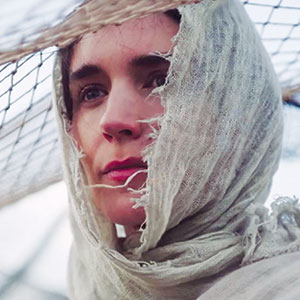The Eastertide story Mary Magdalen has an underpowered Rooney Mara in the title role. This girl of the lonely fisher-village of Magdala isn’t actually a harlotthis was a Dark Ages slander. But she’s the next worse thing: a daughter who disobeyed her parents.
She has a part-time career as a midwife: “Look at me,” she orders a woman at childbirth, laying down next to her, trying to get her to work through it. Her father Daniel (Denis Menochet) wants her to marry an established widower. The unwanted marriage causes the girl such torment that the community decides she’s possessed, forcing her into a watery exorcism at night. Alone and despondent, she meets a wandering rabbi familiar to us all. He comforts her, telling her he knows she doesn’t harbor demons.
At 44, Joaquin Phoenix may be one of the oldest actors to play Jesus, and the choice for a sadder, aged Christ may be justifiable in a time and place where working people got old very early on in life. In real life, Phoenix was raised in a religious cult, and he has a deep understanding of both the grounded and the mysterious qualities of the role.
The miracles are acted with freshness. Mirroring Mary’s midwife strategies, Jesus lays down with Lazarus’s corpse, studying it with compassionate curiosity before bringing the dead man back into the world of the living. In opening the gates of death, Jesus sees something through them: a premonition of the torture awaiting him.
Australian director Garth Davis (Lion) shot this in the rock-strewn parts of southern Italy and Sicily, in a blue-filtered twilight. Johann Johannsson’s looped strings and pianos mirror the melancholiness. The moon waxes as the apostles walk on goat paths through an empty land. It’s a nomad’s film, with dialogue that often, as in Terrence Malick films, seems to be surrounded in ellipses (“…the kingdom…”).
The apostles are divided among themselves. Chiwetel Ejiofor’s Peter is a lieutenant who never quite understands what Jesus is getting at. Judas (Tahir Rahim, very good) is the het up zealot, certain that it’s the time to strike against the Roman occupiers.
One sees the Roman handiwork throughoutthe visuals of burnt bodies and starved villages equal the historian Tacitus’ line: “They made a desert and called it peace.” It isn’t until the first hour is over that we get sight of a mounted legionnaire, an encounter full of fright, like when a lone Comanche rides up in a cowboy film. The entry into Jerusalem is similarly tenseafter all that lonely country, the group comes up the side of a steep mountain fortress. It’s the world’s howling madhouse, where bleating animals are sold with all the religious dignity of a ballpark concessions stand.
As always, one dreads how the story ends. Davis makes it bearable, as opposed to the way it went down in The Passion of the Christ. That carnage recalled novelist Chris Fuhrman’s description of a Catholic priest art teacher looking over a crucifixion drawn by a couple of his 12-year-old students. They’d gone very heavy on the red crayolas. The priest sighs, “I doubt if he’d rise again after all that, boys…”
The trial of Jesus is an audience favorite, with room for hammy acting by Herod and Pilate. Davis bypasses this with the convenient action movie shortcut of knocking a character out and letting them come to later, just to advance the action. There’s nothing really between Judas’ betrayal and Jesus hauling the crosspiece up the Via Dolorosa. The sadness of what follows outweighs the disgust. Mary Magdalen’s part is to sit and commune with her rabbi as he dies. In the background we see little clusters of families and friends, seated in their own vigils at the foot of other crosses.
Phoenix’s sensitivity overwhelms the callouses one has against the Greatest Story Ever etc., and the bruises one accumulates in a lifetime of dealing with hateful Christians. Against this mysterious poignancy, Mara seems a bit lost and underpowered. She looks to the horizon and smiles beatifically, but she’s she’s mostly a witness, not knowing how to love him, as that bad old song goes. Despite this, there are intelligent and careful moments throughout; I liked the suspiciousness with which the elder Mary (Irit Sheleg) looks at this traveling woman, and the way she confides about her son: “He was never really mine.”
Mary Magdalene
R; 120 Mins.
Opens Friday at 3Below




